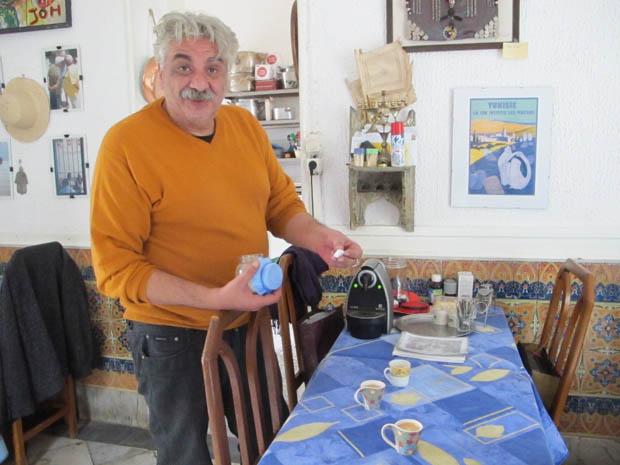Tunisia’s Jews And The Country’s New Rulers
Jacob Lellouche is one of 1,200 or so Jews in Tunisias population of 10 million people. (Photo: Ben Gilbert)
Jacob Lellouche is one of 1,200 or so Jews in Tunisia’s population of 10 million people. He’s the only Jew who ran for parliament in last month’s elections. He lost, although one member of his multi-religious party was elected.
He’s not exactly happy that the moderate Islamic political party, Ennahda, is heading the new government. But he doesn’t see it as the end of the world, either.
“We have to give time, to see what happens on next 8 months, and see where the conductor takes the train,” he said.
Lellouche is actually more concerned about issues like preserving women’s rights in one of the Arab world’s most secular countries, than about the status of Jews here.
Lellouche spoke at an old, high ceilinged house that he’s turned into the only kosher restaurant in Tunisia. It’s called Mamie Lily, after his 83 year old mother, who’s the chef.
The kitchen staff clean up the silverware and plates after lunch. Two Muslims work in the kitchen, and people from all religions dine here, Lellouche said. In the dining room, the walls are decorated with black and white family pictures and Jewish “Yad,” or Torah pointers. But Lellouche said most Tunisians don’t even know there’s an indigenous Jewish community in Tunisia, which long precedes Christianity or Islam. His desire to change the idea of what is a “Tunisian” spurred him to run for public office.
“A lot of Tunisians think that when you are not Muslim, you cannot run for anything and not contribute to political life in country. You have to live here and be quiet, and it’s enough,” Lellouche said. “But I want to prove to al the Tunisians,, and in this way, I think that I won my election, because I break something in the Tunisians minds. Even if you are Christian or Jewish or Bahia, or without any faith, you can involve yourself in the Tunisian life.”
Lellouche’s restaurant is located in the seaside town of La Goulette, a suburb of Tunis. He said this area used to be home to thousands of Jews.
“In a city like Goulette, all the restaurants were kosher restaurants. Because before the 60’s, there was one mosque, one church, and 14 synagogues,” Lellouche said.
Eighty percent of the town was Jewish. Now, most have now left. Lellouche called the history of Tunisian Jews “big and sad.” Archeological evidence shows Jews have been in Tunisia since at least the third century B-C. The population peaked just after World War II at more than 100,000. It’s been reduced to just over 1000. Most left in the 1950’s and 60’s when violence flared during the Arab-Israeli wars. Other Jews left for better economic opportunities in Europe or the US. But Lellouche said much still remains.
“We have Jewish schools, synagogues, kosher butcher, and kosher restaurant, even if the last one in the country. And for us it is ok,” he said.
Most of the community, and the synagogues and schools, are located on the island of Jerba, in southeastern Tunisia. But Tunis is home to the country’s “Grand Synagogue.” It’s a few blocks from a massive mosque. There have been no instances of violence against Jews since the revolution that overthrew strongman Zine El Abedine Ben Ali in January. But during one of the anti-government marches, there was a demonstration that briefly turned anti-Jewish in front of the synagogue.
The demonstrators chanted “Go Jews, the Army of Mohammad has returned!” for about a minute, then moved on. Roger Bismuth, the head of the Jewish community, said the chants were started by Ben Ali’s undercover police posing as Islamic extremists to make people afraid OF Ennahda and other Islamic political parties. The Ennahda party, which won most seats in the current constitutional assembly, condemned the incident. Since then, Bismuth said, the party’s leaders have gone out of their way to reassure Tunisia’s Jews.
“I was promised by the people from Ennahda,” Bismuth said. “They said ‘no, don’t worry, there will be no change.'”
Bismuth said the Jewish community has not expressed serious fear to him about their future in Tunisia, at least no more so than what he hears from his Muslim friends.
“I’m not worried, as a Jew, but I’m worried as a Tunisian,” Bismuth said, “because our country is in a difficult position. We need to rebuild. If we don’t start having calm, and having tourism comeback here, it’s a big job to make a country start all over again, it’s not that easy. We all share the same worries.”
The 85-year-old Bismuth is no foreigner to anti-Jewish sentiment. He was 16 in 1943when the Germans occupied Tunisia, the only Arab country to be directly ruled by the Nazis during World War 2. He was forced to work in a Nazi labor camp.
In the decades since the war, the strongly secular and tolerant tendencies in Tunisian society have helped to keep the Jewish population here. Though small, it is the largest Jewish community, by percentage, in the Arab World. Gilles Jacob Lellouche hopes things will stay that way. With the fall of Ben Ali’s government came the lifting of restrictions on starting non-governmental and cultural organizations. So, Lelouche has founded a cultural center called “house of memory” to preserve the history of Jews in Tunisia.
And he hopes to open a Jewish museum in Tunis next year.
